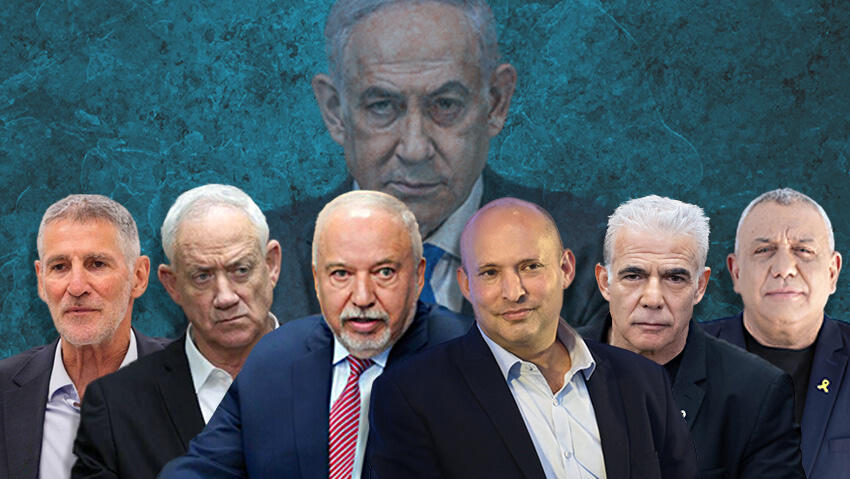Opposition leaders weigh united front to unseat Netanyahu in next elections
Lapid, Bennett, Eisenkot, Liberman and Gantz have held private talks in recent weeks; next week they will meet with Yair Golan, though Bennett’s push for a single centrist slate faces resistance from partners fearing a loss of votes
Related Topics
Leaders of Israel's political opposition are scheduled to meet next week to discuss forming a united front against the sitting conservative government and exploring possible party mergers ahead of expected elections next year.
The discussions come after a series of one-on-one meetings in recent weeks between Yair Lapid, Naftali Bennett, Gadi Eisenkot, Avigdor Liberman and Benny Gantz. Bennett would prefer a single centrist slate, but his partners fear it could lead to a loss of votes.
1 View gallery


Top: Prime Minister Benjamin Netanyahu; bottom, from L-R: Yair Golan, Benny Gantz, Avigdor Liberman, Naftali Bennett, Yair Lapid and Gadi Eisenkot
(Photo: Shalev Shalom, Yair Sagi, Yuval Chen, Alex Kolomoisky)
The opposition is a hectic potpourri of nationalist, centrist and leftist parties, bound more by their shared opposition to Prime Minister Benjamin Netanyahu than by ideological affinity. Personal rivalries and policy differences continue to breed distrust, making unity a complicated and often fragile endeavor.
However, coordination efforts have intensified in recent weeks, with talks among the main players in the center-left, Lapid of Yesh Atid, Liberman of Yisrael Beiteinu, Gantz of Blue and White, Eisenkot and Bennett, have focused on consolidating political forces.
Their parties have recently commissioned polling to assess which alliances might yield the broadest public support and maximize the bloc’s electoral potential.
Their stated goal is to reach 63 Knesset seats, a number that would allow them to form a functioning government within the 120-seat legislature.
Following their individual meetings, the opposition leaders are expected to gather next week for a joint discussion. While Bennett, Liberman, Lapid and Eisenkot are firmly opposed to cooperating with Netanyahu, Gantz has yet to take a definitive stance, although he has recently hinted that he would avoid talk of political boycotts.
Yair Golan, leader of the leftist Democrats Party, has so far stayed on the sidelines and has not participated in the meetings. Some opposition figures view his positions as too extreme for the centrist coalition they hope to build. Nonetheless, he is expected to join the upcoming talks next week.
Sources say Bennett favors the creation of a single, centrist electoral slate to unite anti-Netanyahu voters. However, some potential partners are hesitant, fearing that such a move could alienate parts of the electorate and result in a loss of votes.
Their immediate priority is to ensure that none of their parties fall below the electoral threshold. Any future leadership of the bloc, they say, would go to the candidate whose party polls best against Netanyahu.
On Sunday, Lapid and Eisenkot met to discuss the situation in Gaza and the urgent need to secure the release of the hostages. Bennett also met with Eisenkot for a similar discussion.
Speaking Monday morning, Liberman said, “Faced with a failed prime minister who only looks out for himself, the Zionist bloc must present a unified team of experienced leaders who will work together for the good of Israeli citizens. The real question is not which party is the largest, but how the Zionist parties together can reach 63 seats."
1Comments
